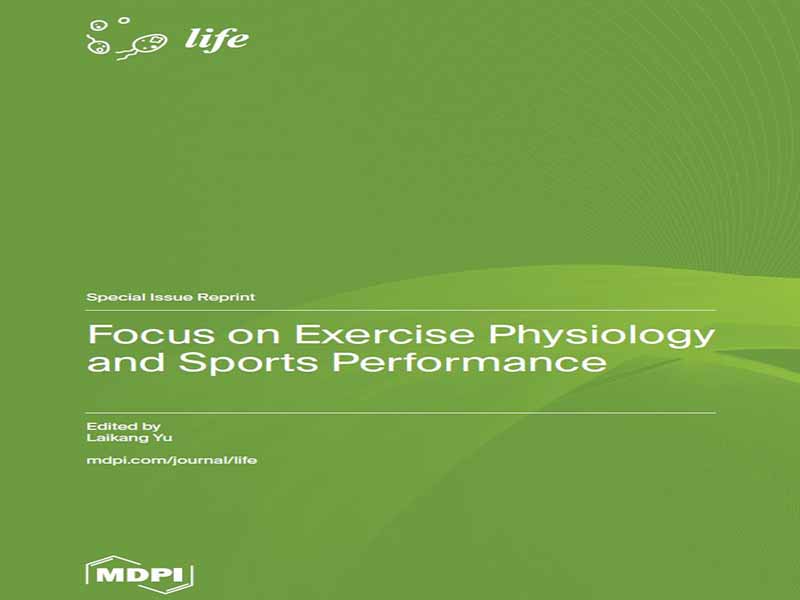- عنوان کتاب: Focus on Exercise Physiology and Sports Performance
- نویسنده: Laikang Yu
- حوزه: فیزیولوژی
- سال انتشار: 2025
- تعداد صفحه: 220
- زبان اصلی: انگلیسی
- نوع فایل: pdf
- حجم فایل: 6.30 مگابایت
فیزیولوژی ورزشی یک رشته علمی حیاتی است که به بررسی شیوه پیچیده تأثیر فعالیت بدنی بر پاسخها و سازگاریهای فیزیولوژیکی بدن انسان میپردازد [1،2]. با توسعه علم ورزش، تأکید بیشتری بر درک فرآیندهای فیزیولوژیکی اساسی که میتوانند عملکرد ورزشی را افزایش دهند، شده است [3]. این امر ضروری است زیرا عملکرد نه تنها به مهارت فنی و عوامل روانشناختی، بلکه به شرایط فیزیولوژیکی فرد نیز بستگی دارد. مطالعات اخیر، تعامل پیچیده بین سیستمهای فیزیولوژیکی مختلف در طول ورزش، به ویژه پاسخهای قلبی عروقی، ریوی و متابولیکی را نشان دادهاند که برای بهینهسازی عملکرد و نتایج سلامتی بسیار مهم هستند [4-6]. به عنوان مثال، ورزش هوازی در درجه اول از طریق سنتز اکسیداتیو آدنوزین تری فسفات (ATP) به انرژی نیاز دارد. تعادل ظریف بین مصرف اکسیژن و تولید دی اکسید کربن در سلولهای عضلانی ارتباط نزدیکی با حداکثر جذب اکسیژن (VO2max)، یک شاخص کلیدی ظرفیت هوازی و پیشبینیکننده عملکرد ورزشی در جمعیتهای مختلف دارد [7]. این همبستگی، نقش حیاتی سیستمهای قلبی عروقی و ریوی را در حفظ فعالیت بدنی برجسته میکند. علاوه بر این، تغییرات فیزیولوژیکی که با ورزش منظم رخ میدهند، مانند افزایش عملکرد میتوکندری و بهبود اکسیژنرسانی، در افزایش عملکرد و سلامت کلی نقش اساسی دارند [8]. تحقیقات معاصر بر اهمیت درک واکنشهای فیزیولوژیکی به روشهای مختلف ورزشی، از جمله تمرینات تناوبی با شدت بالا (HIIT) تأکید بیشتری کردهاند [9،10]. این اشکال ورزش، پاسخها و سازگاریهای متابولیکی متمایزی را ایجاد میکنند و بر عواملی مانند هیپرتروفی عضلات، افزایش قدرت و انعطافپذیری متابولیک تأثیر میگذارند [11،12]. علاوه بر این، اهمیت ورزش در مدیریت بیماریهای مزمن و بیماریهای عصبی، به طور فزایندهای شناخته شده است و آن را به بخش اساسی مراقبتهای بهداشتی پیشگیرانه تبدیل کرده است [13،14]. به طور خلاصه، فیزیولوژی ورزش اساس درک چگونگی تأثیر فعالیت بدنی بر سلامت و عملکرد انسان را تشکیل میدهد. با بررسی مکانیسمهای فیزیولوژیکی درگیر، محققان و متخصصان میتوانند برنامهها و مداخلات آموزشی مؤثرتری را برای افزایش عملکرد ورزشی و ارتقاء سلامت کلی توسعه دهند.
Exercise physiology is a crucial scientific discipline that explores the complex manner in which physical activity influences the physiological responses and adaptations of the human body [1,2]. With the development of exercise science, more emphasis has been placed on understanding the underlying physiological processes that can augment sports performance [3]. This is essential because performance hinges not only on technical skill and psychological factors but also on an individual’s physiological condition. Recent studies have demonstrated the complex interaction between various physiological systems during exercise, especially the cardiovascular, pulmonary, and metabolic responses, which are crucial for optimizing both performance and health outcomes [4–6]. Aerobic exercise, for instance, primarily demands energy through oxidative adenosine triphosphate (ATP) synthesis. The delicate balance between oxygen consumption and carbon dioxide production within muscle cells is closely related to maximal oxygen uptake (VO2max), a key indicator of aerobic capacity and a predictor of sports performance across diverse populations [7]. This correlation highlights the critical role of the cardiovascular and pulmonary systems in sustaining physical activity. Moreover, the physiological changes that occur with regular exercise, such as enhanced mitochondrial function and improved oxygen delivery, are pivotal in enhancing performance and overall health [8]. Contemporary research has further emphasized the importance of understanding the physiological reactions to various exercise modalities, including high-intensity interval training (HIIT) [9,10]. These forms of exercise elicit distinct metabolic responses and adaptations, influencing factors such as muscle hypertrophy, strength development, and metabolic flexibility [11,12]. Additionally, the significance of exercise in managing chronic diseases and neurodegenerative diseases has gained increasing recognition, making it a fundamental part of preventive healthcare [13,14]. In short, exercise physiology forms the basis for understanding how physical activity affects human health and performance. By exploring the physiological mechanisms involved, researchers and practitioners can develop more effective training programs and interventions to enhance sports performance and promote overall wellbeing.
این کتاب را میتوانید از لینک زیر بصورت رایگان دانلود کنید:
Download: Focus on Exercise Physiology and Sports Performance



































نظرات کاربران